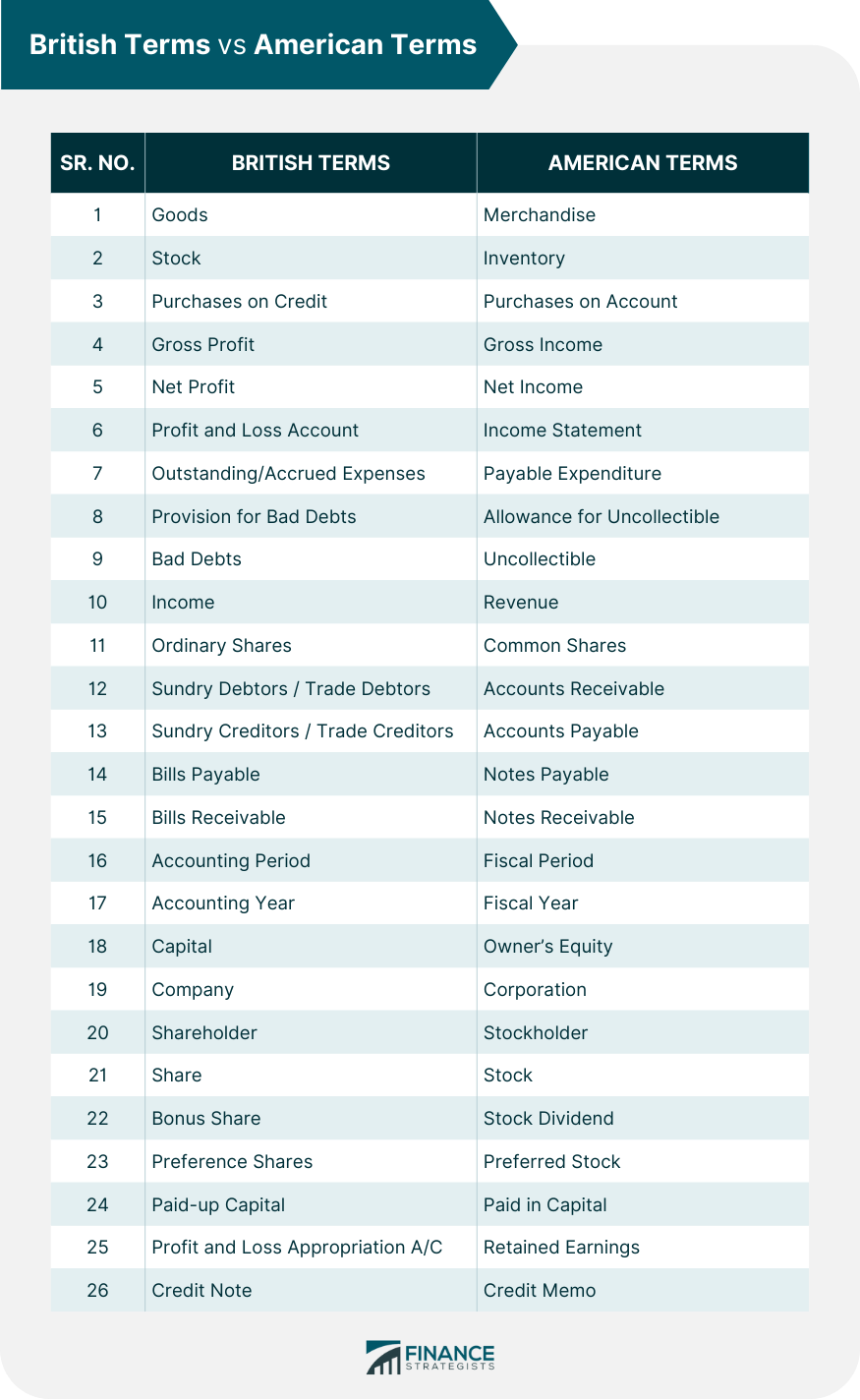Although Basic Principles of Accounting are almost the same all over the world, the American Accounting practices differ to some extent from the British Accounting practices. Some American terms are given below which are equivalent to British terms:Sr. No. British Terms American Terms 1 Goods Merchandise 2 Stock Inventory 3 Purchases on Credit Purchases on Account 4 Gross Profit Gross Income 5 Net Profit Net Income 6 Profit and Loss Account Income Statement 7 Outstanding/Accrued Expenses Payable Expenditure 8 Provision for Bad Debts Allowance for Uncollectible 9 Bad Debts Uncollectible 10 Income Revenue 11 Ordinary Shares Common Shares 12 Sundry Debtors / Trade Debtors Accounts Receivable 13 Sundry Creditors / Trade Creditors Accounts Payable 14 Bills Payable Notes Payable 15 Bills Receivable Notes Receivable 16 Accounting Period Fiscal Period 17 Accounting Year Fiscal Year 18 Capital Owner’s Equity 19 Company Corporation 20 Shareholder Stockholder 21 Share Stock 22 Bonus Share Stock Dividend 23 Preference shares Preferred stock 24 Paid-up Capital Paid in Capital 25 Profit and Loss Appropriation A/C Retained Earnings 26 Credit Note Credit Memo 
Accounting Terms – British vs American FAQs
The main difference between British and American accounting terms is the language used to describe financial information. In the United States, Generally Accepted Accounting Principles (GAAP) govern how businesses prepare their financial statements, while in Great Britain, companies use International Financial Reporting Standards (IFRS). Additionally, some words have different meanings between the two countries; for example, “assets” in Great Britain refers to fixed physical items such as plants or machinery, while it could refer to current assets such as cash or receivables in America.
Yes – in general, GAAP governs accounting in the United States, while IFRS governs accounting in Great Britain. Each set of rules provides guidelines and requirements for how financial statements should be presented and reported.
Yes – some common tax terms may have different meanings or implications in Britain compared to America. For example, “taxable income” has a slightly different definition in each country; whereas it is considered gross income minus deductions in America, taxable income includes certain allowances and reliefs specific to Britain.
When evaluating British vs American accounting terms, organizations should also consider differences related to ownership structure, reporting requirements, and company law. These factors may influence the way financial information is reported, as well as the type of language used to describe it.
Yes – many organizations offer educational courses and seminars that focus on understanding differences between British and American accounting terms. Additionally, online resources such as accountingschools.com provide helpful guides that explain common terminology in both countries. Additionally, consulting with a professional accountant or CPA can ensure all accounting practices are compliant with local laws and regulations.
True Tamplin is a published author, public speaker, CEO of UpDigital, and founder of Finance Strategists.
True is a Certified Educator in Personal Finance (CEPF®), author of The Handy Financial Ratios Guide, a member of the Society for Advancing Business Editing and Writing, contributes to his financial education site, Finance Strategists, and has spoken to various financial communities such as the CFA Institute, as well as university students like his Alma mater, Biola University, where he received a bachelor of science in business and data analytics.
To learn more about True, visit his personal website or view his author profiles on Amazon, Nasdaq and Forbes.











